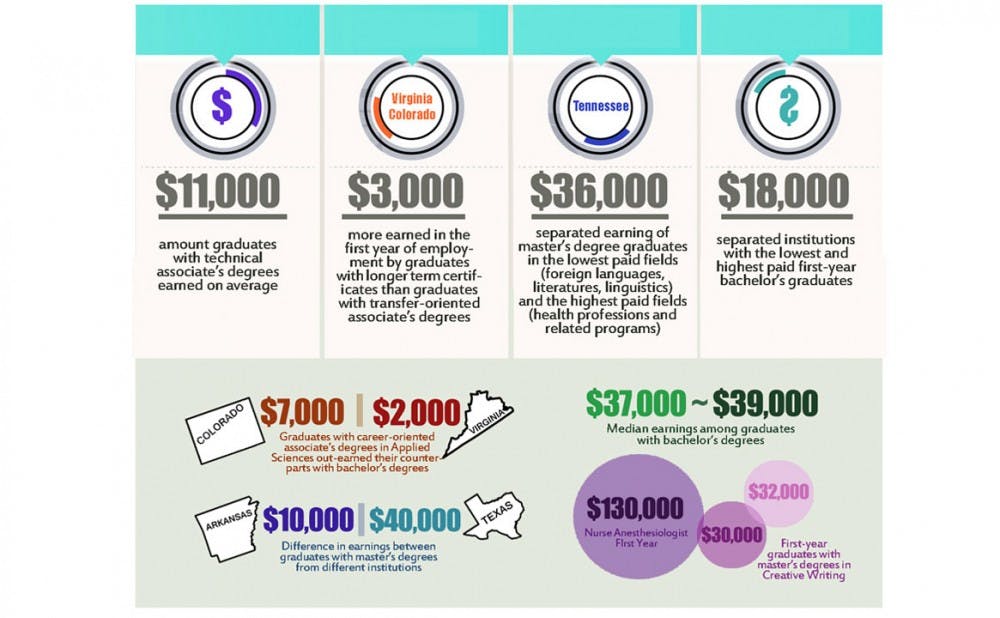What you major in may matter more than where you go to school, according to a recent study.
College Measures, a partnership between American Institutes for Research and Matrix Knowledge Group recently found that associate degree graduates earn about the same as bachelor degree graduates on average, but are out-earned by graduates with a technical degree. The study uses data from postsecondary education records for graduates from mostly public institutions—such as Arkansas, Colorado, Tennessee, Texas and Virginia—and matches them with information from state unemployment insurance agencies.
“[The results were] so uniform and so powerful that I’d be shocked if they don’t pertain to students at fairly elite private institutions,” said Mark Schneider, president of College Measures and vice president of American Institutes for Research.
Schneider explained that engineers are the highest-paid profession and graduates with majors in humanistic subjects, such as philosophy, will not make wages to compensate for expensive tuitions.
Similarly, there is a discrepancy between the earnings of graduates of science, technology, engineering and math programs. According to the study, graduates who majored in math, engineering and computer sciences out-earn those who majored in sciences, such as chemistry and biology.
For example, graduates with a bachelor’s degree in mathematics in Texas earn $48,875 their first year, whereas those with the same degree in chemistry earn $36,090, according to the study.
Additionally, graduates with degrees in biology—the field with the largest number of science graduates—often earn less than English majors in their first year. Those with a bachelor’s degree in biology in Texas earn $26,430 in their first year, and graduates with the same degree in English and literature earn $31,770.
Steve Nowicki, dean and vice provost of undergraduate education, said he disagrees with the study because higher education shouldn’t be quantified by exit salaries.
“The challenge that we have when we’re thinking about higher education is that we tend to lump higher education all together, when in fact it’s a very complex ecosystem of kinds of institutions that have different kinds of optimal outcomes,” Nowicki said.
Schneider noted, however that the research may not be relevant for Duke students since it is common for graduates to continue their education through graduate school.
“The world that Duke students live in is a very limited and elite one,” he said.
The study warns that the earnings from early, post-graduation careers may not accurately reflect the long-term earnings of graduates, which College Measures is still working to assess.
Although the study questions the value of receiving a degree from a particular school, Khadijah Bhatti—Trinity ‘12 and public policy major—explained that coming from an elite institution was beneficial in her job search.
“People definitely respond to the fact that you’re from a prestigious university,” Bhatti said. “It’s difficult to say whether the major itself affected where I ended up … If you can relate your major to the job you’re doing, recruiters will respond to that.”
Ian Harwood—Trinity ‘13 and also a public policy major—noted, however, that in his field of work the Duke brand name does not carry much weight.
“I have friends [who majored in computer science] who are making lots of money... I’m not making any money, but I guess in my experience it’s not so simple as, ‘Man I wish I was studying engineering so I was making more money,’” he said. “My path has just been a little less clear.”
Nowicki said the mark of a good education is if students learned how to learn, communicate, think and problem-solve. He added that the Duke general curriculum and different major requirements all provide students with these skills.
“The worth of an education is something that can only be calculated on someone’s deathbed,” Nowicki said. “At the end of our lives we’re all going to ask ourselves, ‘Did we do something that was fulfilling to us, that brought us happiness, that made a difference in the world?’ and that’s where one is going to ask, ‘Was my education worth it?’”
Get The Chronicle straight to your inbox
Signup for our weekly newsletter. Cancel at any time.

